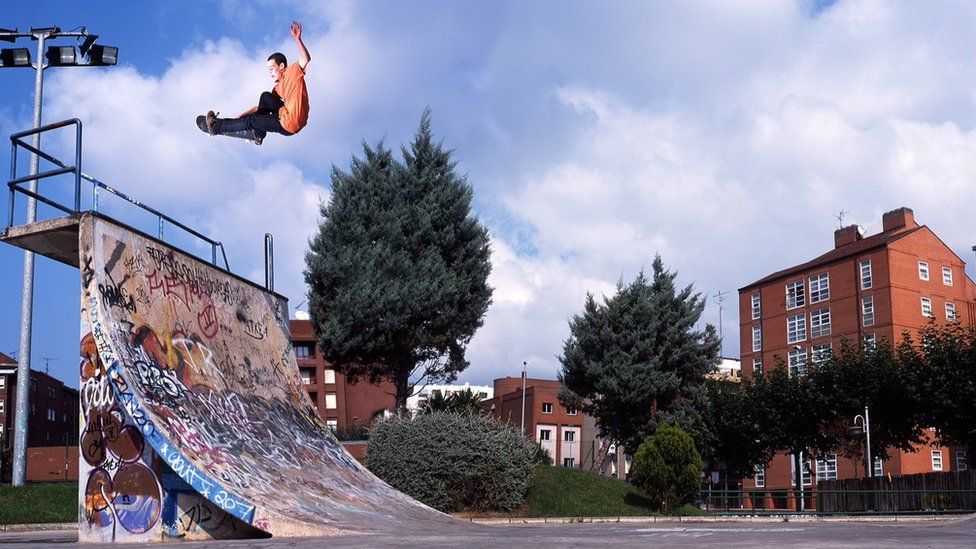The death of a British skateboarding hero
- Published

Ben Raemers has been described as one of the greatest British skateboarders ever. Last month he killed himself. His death has caused the soon-to-be Olympic sport to ask some difficult questions about mental health.
Ben Raemers was 10 when he first jumped on a skateboard, while living in his mum's flat in Walton-on-the-Naze, Essex.
Like a lot of boys his age, he fell in love with the sport straightaway.
He bought his first skateboard at Argos, and within a few years, was regarded as one of the best skateboarders in the world.
"He saw these people skateboarding and he was like, 'Oh wow, that looks really fun,'" his sister Lucy says.
"Then he came home and asked mum for a skateboard."
It quickly became obvious that Ben had a special talent.
He impressed friends and family with the ease with which he was able to do complicated tricks.
His interest in supporting his local skateboarding community soon got him noticed too.
"He got a petition started to get a skate park built at home. From then on, he was obsessed," Lucy says.
Lee Blackwell was friends with Ben for 18 years.
He was one of the first people to help Ben develop his skateboarding, taking him to some of the UK's biggest competitions when he was just 14.
"People really noticed Ben, you could not ignore him. He was just that good," says Lee.
Ben was 18 when he started to garner attention in America, competing and getting support from big brands, including shoe company Converse and skateboarding firm Enjoi.
"It is not common for British names to gain commercial success with huge American brands," says James Threlfall, a professional skateboarder.
"He is one of the most successful British skaters to ever cross over to America."
Ben was one of the few British skaters to be featured on the front cover of the most influential skateboarder magazine, Thrasher.
"One of his biggest achievements was winning the King of the Road competition," Lucy says.
"That was insane. He was doing tricks barefoot. No-one else was doing that."
Find out more
Listen to Losing a Skateboarding legend at BBC Sounds.
Or catch up with The Next Episode podcast online.
Ben's death was announced last month.
He was just 28.
Last week, skateboarders from around the world came together for his funeral.
Leo Sharp, a skateboarder and photographer, said the loss of Ben has hit the skateboarding community hard.
"He was like a brother to so many skateboarders worldwide," he says. "He will be sorely missed."
His death has also left some questions to be answered.
'Rock and roll lifestyle'
Before his death, Lucy says Ben had been struggling with mental health problems.
"He would ring me and say, 'I'm suicidal'. He was drinking loads. He was up and down the whole time. He tried to get help but he didn't want it and he just plummeted."
Lucy says there is a problem specific to the sport.
"Skateboarding involves a rock and roll lifestyle. You're skating and you're boozing. It's all fun.
"But with skateboarding you have a lot of spare time on your hands so it's easy to fall into a hole of addiction."
His death comes as skateboarding prepares to enter the Olympics for the first time.
It is one of five new sports that will be added to the Tokyo 2020 Games.
Skateboard England, the sport's governing body, looks after both grassroots and elite skateboarders.
It has received investment from the Aspiration Fund - an initiative by the Department of Culture, Media and Sport to support skateboarders' ambitions to succeed in the 2020 Games in Tokyo.
However, James Hope-Gill, chief executive of Skateboard England, says the body does not currently provide any mental health support for skateboarders.
He says this needs to change.
"This is certainly something we need to address and need to look at."
Mental health agenda
Last week, BBC podcast The Next Episode featured Ben's death.
Since then James says he has had a number of individuals approach him with offers of support.
He is looking to develop a mental health support system for skateboarders and is shortly sending one of his team on a "Promoting Positive Mental Health in Sport" workshop with Sport England.
Skateboard England needs to "explore and learn more about the mental health agenda", he says.
If you are struggling with suicidal thoughts, contact the Samaritans on the free helpline 116 123, or click on this link to access support services.
- Published18 May 2019